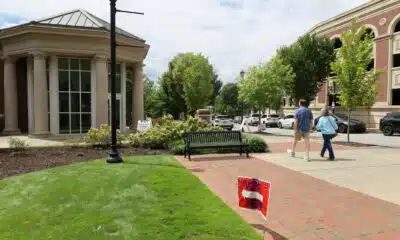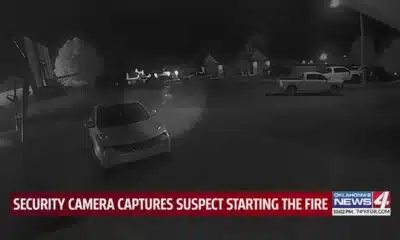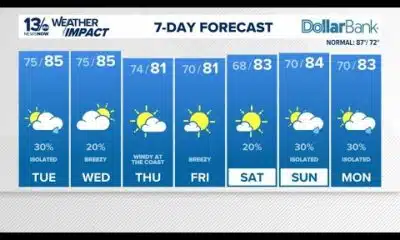News from the South - Texas News Feed
What Texas lawmakers did after the state’s largest wildfire
“What Texas lawmakers did after the state’s largest wildfire” was first published by The Texas Tribune, a nonprofit, nonpartisan media organization that informs Texans — and engages with them — about public policy, politics, government and statewide issues.
Sign up for The Brief, The Texas Tribune’s daily newsletter that keeps readers up to speed on the most essential Texas news.
LUBBOCK — Texas lawmakers approved a series of bills this year that aim to better prepare Texas for wildfires and to mitigate their damage.
The legislation includes a study on wildfire risk zones, increasing funding for rural volunteer fire departments, and creating a statewide inventory of firefighting equipment that is accessible to all fire departments in Texas.
The legislative package was inspired by the state’s largest wildfire in history. The Smokehouse Creek fire scorched more than 1 million acres in the Panhandle and killed three people. A special House committee was formed following the fires to investigate the cause and make legislative recommendations.
Senate Bill 34, filed by state Sen. Kevin Sparks, R-Midland, is the most sweeping proposal. It includes a study on fuel loads, which is material that is likely to catch fire in a specific area, such as dry grass or vegetation. The study would also establish wildfire risk zones for residents, homes and businesses. The bill also creates a statewide database of firefighting equipment and increases funding to volunteer fire departments in areas at high risk for large wildfires.
Rep. Ken King, a Republican who lives in Canadian where much of the damage from the wildfires took place, co-sponsored the bill. King led the House committee that investigated the fires and later released a detailed report about the disaster.
“We took a lot of testimony, and a lot of work went on to do what’s right for our volunteer firefighters,” King said. “Senate Bill 34 combines several volunteer firefighter priorities.”
The bill requires that at least 10% of the money in the Rural Volunteer Fire Department Assistance program go to volunteer fire departments in areas at high risk for large wildfires. Texas A&M Forest Service and West Texas A&M University will launch a study to determine wildfire risk zones based on fuel loads of flammable material like vegetation.
Most of the wildfires that burned through the Panhandle started when power lines came into contact with dry vegetation. The Smokehouse Creek fire started when a rotten utility pole snapped and the power lines landed on dry grass.
The bill requires that researchers consider several factors when determining these risk zones, including the projected loss of life, property and natural resources should a wildfire occur in the zone and the financial impact of costs associated with recovering after a wildfire. This study is due by Dec. 1, 2026, and would be submitted to the governor, lieutenant governor, and the Legislature.
“Constant wildfire threats that require preparation, coordination, and resources is the most pressing issue for the Panhandle,” Sparks said in a previous statement.
Another recommendation from the House committee report was the statewide inventory of firefighting equipment that is available during a wildfire. According to the report, there was an uncoordinated response between responding agencies during the Panhandle fires, and a lack of knowledge about what equipment agencies had and what was needed.
Texas A&M Forest Service, the state agency that manages Texas’ forests and natural resources, will operate and maintain the database. Fire departments will be able to see equipment descriptions, search by location and equipment types, and have contact information for fire departments listed in the database. Volunteer stations will also have access to the inventory.
One of King’s bills also addresses what he and other lawmakers have deemed a regulatory “no man’s land,” as state agencies lacked the authority to inspect power lines at oilfield well sites and facilities. Lawmakers identified this as a problem after the investigative committee concluded that unmaintained electrical lines for oilfield equipment started the Smokehouse Creek Fire and others in that same week. Data from the Forest Service shows power lines have caused roughly 60% of fires throughout the Panhandle since 2006.
Under King’s bill, the Railroad Commission, which oversees the oil and gas industry, will notify the Public Utility Commission when it identifies substandard power lines at well sites or at other facilities used for oil and gas production. The notification must include a description of the condition and whether the well is abandoned. The Railroad Commission must also notify the landowner.
The two agencies will then work together to request that a state fire marshal or local authority to inspect the site, and request that the electric service provider disconnect service.
While the Legislature made a lot of progress toward improving the state’s response to wildfires, one bill that failed to pass would have created a statewide network to connect all first responders and state agencies.
House Bill 13, by King, sought to create the Texas Interoperability Council, which would be tasked with the implementation of a statewide plan for emergency communication use. The proposal was praised by first responders during the legislative process. Texas Division of Emergency Management Chief Nim Kidd testified to lawmakers in March that it was the “boldest move” he’s seen in his career.
That bill passed the House in April, but was not taken up by the Senate.
Disclosure: Texas A&M University and West Texas A&M University have been financial supporters of The Texas Tribune, a nonprofit, nonpartisan news organization that is funded in part by donations from members, foundations and corporate sponsors. Financial supporters play no role in the Tribune’s journalism. Find a complete list of them here.
First round of TribFest speakers announced! Pulitzer Prize-winning columnist Maureen Dowd; U.S. Rep. Tony Gonzales, R-San Antonio; Fort Worth Mayor Mattie Parker; U.S. Sen. Adam Schiff, D-California; and U.S. Rep. Jasmine Crockett, D-Dallas are taking the stage Nov. 13–15 in Austin. Get your tickets today!
This article originally appeared in The Texas Tribune at https://www.texastribune.org/2025/06/03/texas-wildfire-legislation/.
The Texas Tribune is a member-supported, nonpartisan newsroom informing and engaging Texans on state politics and policy. Learn more at texastribune.org.
The post What Texas lawmakers did after the state’s largest wildfire appeared first on feeds.texastribune.org
Note: The following A.I. based commentary is not part of the original article, reproduced above, but is offered in the hopes that it will promote greater media literacy and critical thinking, by making any potential bias more visible to the reader –Staff Editor.
Political Bias Rating: Centrist
This article from *The Texas Tribune* focuses on wildfire legislation passed by the Texas Legislature and includes factual reporting on the bills’ content, their sponsors, and the state agencies involved. While it highlights Republican lawmakers and their roles in the legislative process, the coverage remains objective, avoiding partisan framing or emotionally charged language. The piece includes quotes and sources from official reports and state agencies without editorializing or offering ideological commentary. The tone is informative, and the balanced reporting reflects a commitment to neutrality, aligning with the Tribune’s stated nonpartisan mission.
News from the South - Texas News Feed
Texas Democrats’ walkout prompts GOP retribution
“For their walkout, Texas Democrats get national attention — and partisan retribution at home” was first published by The Texas Tribune, a nonprofit, nonpartisan media organization that informs Texans — and engages with them — about public policy, politics, government and statewide issues.
Sign up for The Brief, The Texas Tribune’s daily newsletter that keeps readers up to speed on the most essential Texas news.
When Texas House Democrats returned to the Capitol after walking out over the GOP’s new congressional map, they were cheered by supporters as bulwarks of democracy — then promptly bulldozed by Republicans fed up with their protest and intent on further marginalizing the minority party.
“They will be lucky if they get out of this special session without it being a whole lot worse than it would have been had they just stuck around,” Rep. Tom Oliverson of Cypress and chair of the House Republican Caucus, said last week. “If they had any leverage at the start of the last special session, it’s all gone.”
Democratic lawmakers cast their two-week walkout as a victory for sparking a national movement among blue states for retaliatory redistricting, and for buying time to evaluate a legal challenge to the Republican gerrymander, which aims to net up to five more GOP seats among Texas’ 38 congressional districts. The Democrats said it was just the first chapter of their fight, which they intend to continue by working to kill the new lines in court.
But the move also unified typically factious House Republicans, who are now solidly behind a speaker some once decried as “liberal,” and more emboldened to steamroll any Democratic resistance in the remaining weeks of the special session to pass every conservative priority on the agenda — and then some.
“Democrats did a really good job of getting Republicans united,” said Arlington GOP Rep. Tony Tinderholt, who commended Speaker Dustin Burrows’ handling of the walkout after previously opposing his rise to the speakership.
Republicans moved quickly to drive the map through both chambers of the Legislature within a week of the Democrats’ return. But they also wasted no time advancing a host of conservative priorities that Democrats vehemently oppose, including bills cracking down on the manufacturing and distribution of abortion pills and requiring transgender people to use the bathroom aligned with their sex assigned at birth in government and school buildings.
Those measures stalled in the House during the regular session. And while Gov. Greg Abbott, who controls the special session agenda, had put them on the to-do list from the start, Democrats’ protest has only increased the GOP appetite to push them all through as retribution for the walkout.
“Now we’re not even going to negotiate,” Oliverson said. “We’re just going to slam it through, too bad.”
Democratic lawmakers condemned the expected retaliation but stood by their walkout, arguing that electoral representation was important enough to fight for, no matter the immediate costs.
“This is the linchpin,” House Democratic Caucus Chair Rep. Gene Wu of Houston said Friday. “If we don’t beat this, if politicians in red or blue states just are free to redistrict after every election cycle to make sure that there’s as little dissent as possible — that’s bad for everyone. It’s bad for America.”
Fines and new punishments
The moment Democratic lawmakers fled the state earlier this month, Republicans began clamoring for retribution — from burying Democrats in fines and stripping them of their committee vice chairmanships to kicking them out of their duly elected offices.
By the time Democrats returned two weeks later, Abbott had called a new special session with virtually the same agenda that stalled in the first, and Burrows was promising to muscle through every item on the call, “and even some more.”
Legislation Democrats oppose was put on a fast track to passage, with the so-called bathroom bill and abortion pill clampdown both set for a hearing last week as soon as the map cleared the House. Burrows said he expected to complete the governor’s agenda by Labor Day weekend, almost two weeks before the 30-day session times out.
“There’s a definite loss from a negotiating standpoint on many other bills that we did not want to see hit the floor,” said Rep. Terry Canales of Edinburg, a Democrat who did not participate in the walkout.
The House adopted the new map along party lines on Wednesday, releasing Democratic lawmakers from the around-the-clock police escort Burrows had imposed to ensure their attendance.
Just over an hour later, Abbott expanded the session agenda to include punishments for lawmakers who “willfully absent themselves” to block the passage of legislation.
New penalties are needed, Abbott said in a press release, “to ensure that rogue lawmakers cannot hijack the important business of Texans during a legislative session by fleeing the state.”
Republican lawmakers have filed bills in both chambers that would declare a member’s seat vacant if they are absent for seven consecutive days without permission. The proposal swiftly picked up enough joint and coauthors in the House to pass the chamber, with several key Republicans in leadership signing on. And another measure — designated House Bill 18, signaling it has Burrows’ blessing — would limit political donations to lawmakers who leave the state to stall legislative action, with stiff fines for violators.
The absent Democrats were already subject to daily fines while they were away on their latest quorum break. The final tally amounted to $9,354 for each member, including $500-per-person penalties for every day of the walkout and certain costs incurred in securing their attendance.
“The fines are, for sure, going to be a big issue,” Rep. Jeff Leach, R-Allen, said. “We’re not going to just let those go away.”
Upon the Democrats’ return, Burrows said the House would remain a chamber where “the minority has the right to be heard.” But he underscored that it would also be one where “the majority has the right to prevail,” and by the end of Wednesday, he was heralding a “new chapter of Republican unity” ushered in by the map’s passage.
“These past few weeks have not been easy, but the House members who showed up for work every day have shown a dedication to their constituents that will not be forgotten,” he said. “I am proud to have led my colleagues in this important achievement.”
“I’m tired of being blamed as the minority party”
Democrats argued that the map would unconstitutionally suppress the vote of Black and Latino Texans and needed to be defeated in court. They said their protest was necessary to inspire a national response to what they framed as an attempt by President Donald Trump to stack the deck in next year’s midterm election and hold onto Republican control of the U.S. House.
“The quorum break was successful, I think, beyond our wildest dreams,” Wu said last week, pointing to California’s moves to adopt a new congressional map with five new Democratic districts that could cancel out the expected GOP gains in Texas. “The public now sees [Republicans’] corruption. They see where the swamp actually is.”
Still, the intensity of Texas Republicans’ efforts to drag Democratic lawmakers back to the Capitol reached new levels during this year’s walkout, with Republicans working to eliminate quorum breaks, the minority party’s last tool of resistance.
“Republicans have gone so far that they are nothing more than bullies,” Rep. Ann Johnson, D-Houston, said Wednesday as she clutched a permission slip from Burrows allowing her to leave the chamber. “I’ve never seen this kind of venom and retribution for a group actually advocating for minority voices, and I think it’s pretty self-defeating and disruptive.”
Democratic lawmakers recognized that their protest would prompt Republican backlash and grease the path for legislation they opposed.
But they put those outcomes on their Republican colleagues, arguing that Democrats were fighting for fair representation using time-honored strategies, and that they ultimately showed up knowing the map — and other socially conservative priorities — would prevail on the floor.
“I’m tired of being blamed as the minority party for the wrong actions of the majority,” Johnson said. “It is not my fault that the party is now based on cruelty. The people that get punished with this political agenda right now in the special [session] are the most vulnerable people in Texas that I am defending at every point I can.”
In a shift, some Democrats also began holding Burrows, who they propelled to the speakership in January, responsible for the map’s passage and the partisan retribution. Wu, the House Democratic leader, said he didn’t think “the people will want us to support him again.”
“We all took an oath to uphold the Constitution, not to flagrantly violate it or to test its limits,” Rep. Vince Perez, D-El Paso, said on the floor last week. “It is shameful what is happening here, Mr. Speaker, and with this, I can no longer in good conscience continue to support you.”
More all-star speakers confirmed for The Texas Tribune Festival, Nov. 13–15! This year’s lineup just got even more exciting with the addition of State Rep. Caroline Fairly, R-Amarillo; former United States Attorney General Eric Holder; Abby Phillip, anchor of “CNN NewsNight”; Aaron Reitz, 2026 Republican candidate for Texas Attorney General; and State Rep. James Talarico, D-Austin. Get your tickets today!
TribFest 2025 is presented by JPMorganChase.
This article originally appeared in The Texas Tribune at https://www.texastribune.org/2025/08/25/texas-democrats-quorum-break-retribution-penalties/.
The Texas Tribune is a member-supported, nonpartisan newsroom informing and engaging Texans on state politics and policy. Learn more at texastribune.org.
The post Texas Democrats’ walkout prompts GOP retribution appeared first on feeds.texastribune.org
Note: The following A.I. based commentary is not part of the original article, reproduced above, but is offered in the hopes that it will promote greater media literacy and critical thinking, by making any potential bias more visible to the reader –Staff Editor.
Political Bias Rating: Center-Left
The content presents a perspective that is generally sympathetic to Democratic lawmakers and critical of Republican actions, particularly regarding redistricting and legislative retaliation. It highlights Democratic concerns about voter suppression and minority representation while portraying Republican responses as punitive and heavy-handed. The tone and framing suggest a center-left bias, focusing on issues of fairness and democratic principles without adopting an extreme partisan stance.
News from the South - Texas News Feed
Tropical update: Tracking wave in Atlantic with low chance for development
SUMMARY: KHOU 11 meteorologist Pat Calvin reports a quiet tropical update with two main areas of interest. Tropical Storm Fahrenon, east of Bermuda with 45 MPH winds, is moving north-northeast at 15 MPH and expected to dissipate by Wednesday as it heads out to sea. Meanwhile, a tropical wave east of the Lesser Antilles has a low 30% chance of development. Factors limiting growth include Saharan dust and easterly wind shear, despite warm waters in the 80s and 40 MPH winds. Models show less organization and reduced development odds, keeping any system mostly south of Hispaniola. No immediate threats to the U.S. are expected.
Conditions aren’t favorable for any significant organization at the moment, so development odds have been kept low for the time being.
News from the South - Texas News Feed
DEA agents uncover 'torture chamber,' buried drugs and bones at Kentucky home
SUMMARY: Federal agents in London, Kentucky, investigating Scottie Shelton, discovered a disturbing “torture chamber” in a metal building on his property, complete with restraints and weapons. They found a strong odor of decay and buried drugs, including 6,000 oxycodone pills and 1,200 grams of methamphetamine. Shelton admitted to burying drugs and unintentionally forgetting their locations. Authorities also uncovered numerous unreported animal remains, including deer skulls and bobcat mounts, leading to 24 state wildlife violation counts. Shelton faces federal charges for possessing methamphetamine with intent to distribute and is held in Laurel County Detention Center under U.S. Marshal custody.
The post DEA agents uncover 'torture chamber,' buried drugs and bones at Kentucky home appeared first on www.kxan.com
-
News from the South - Arkansas News Feed7 days ago
Trump, Zelenskyy exit White House talks hopeful about security guarantee for Ukraine
-
News from the South - West Virginia News Feed7 days ago
Religious exemption debate front and center amid new school year in WV
-
News from the South - Alabama News Feed6 days ago
U.S. agriculture secretary announces end to subsidies for solar panels on farmland
-
News from the South - Kentucky News Feed5 days ago
First of its kind clinical trial offers new hope for Kentuckians at risk of dementia
-
News from the South - West Virginia News Feed6 days ago
Free AI testing platform rolled out to federal employees
-
News from the South - Virginia News Feed7 days ago
Low 80s and winds possible from Hurricane Erin
-
News from the South - Georgia News Feed6 days ago
Don't eat this shrimp sold at Walmart due to possible radiation contamination: FDA
-
News from the South - Arkansas News Feed6 days ago
Cities across the US are embracing AI guidelines for local government workers










































